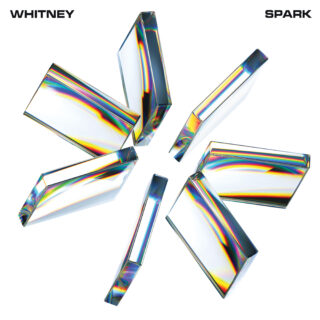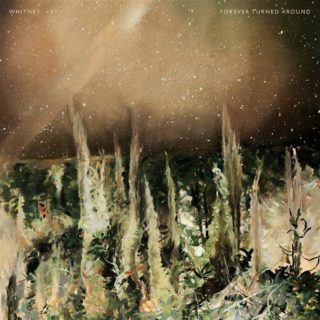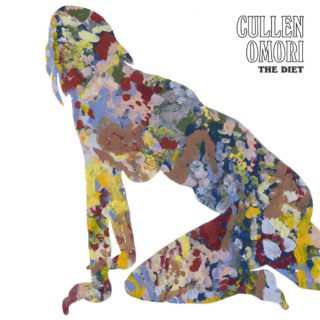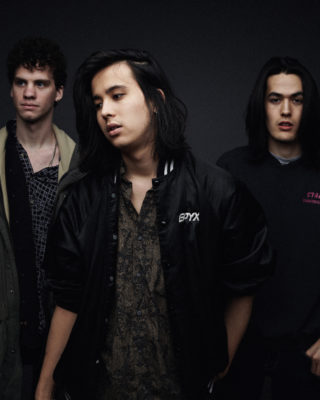
Young. Shy. Your best. There are certain things it’s hard to feel when sat opposite Smith Westerns. Even at 15 I’m pretty sure I looked more haggard than they do, and they’re entering their twenties in a touring band that “get fucked up” as early in the week as Wednesday morning. “The drive from Glasgow to London was pretty easy,” says singer Cullen Omori. “I had some Valium left over so I’d, like, close my eyes for a second and lose three hours.” They dress better than most people too, and most bands. When we meet up four days after our photo shoot in Manchester, Cullen gets away with keeping his sunglasses on indoors. His faded Star Spangled Banner waistcoat is wildly brave. On the wrong back it’d be proud American tourist uniform, in need of a fanny-pack full of traveller’s cheques and tube maps.
It’s the shy thing that’s really impossible to entertain though – if you don’t speak, there’s nothing, just the sound of your background, which in this instance is Camden High Street. It’s understandable enough. The band are in the UK to promote an album that they’ve already released back home, earlier this year and to frenzied acclaim. ‘Dye It Blonde’ has recently had them finally complete their first headline tour, and now here they are, opening for The Vaccines and schlepping around Europe ahead of the record’s transatlantic release in May, back where they started, answering all the same questions they were asked in December.
“I would like to think that with it being out already in America, and that being so positive, it’d be like that here,” says Cullen, “but of course that’s not the case. We have to do the whole process over again.”
“We have got a new member though,” says Cameron [the band’s bassist and brother of Cullen], “so we’re playing the same songs live that we were playing a year before it came out anywhere, but with a new keyboardist we’re still trying out different things live, and that’s tiding us over for now.”

Cullen says that the increase in venue size helps too, and when the band return home they’ll play some of their largest shows yet, touring with Yeasayer and Wilco.
“I think I’m more in love with the record now,” he says. “I didn’t like it in the beginning. For some reason, in my head I thought it was going to be the greatest record of all time, but then, after time constraints, our playing ability constraints and my singing ability constraints were all factored in, I was like, ‘ahhh, this isn’t that good.’ But then I took a break from it and when I went back to it I really felt like this was a real band playing – it didn’t sound like our home recordings or anything like that.”
Not like the band’s eponymous debut album of 2009, which was recorded in guitarist Max Kakacek’s basement and instantly gave the US lo-fi scene its very own scuzzy version of T-Rex. So full of Bolan pomp were tracks like ‘Girl In Love’ that the band never challenged such comparisons; they courted them. It was a fair cop, and besides, ‘glam pop’ seemed far more desirable than ‘Nuggets-esque garage band’, which is what Smith Westerns were being called before.
Really though, the star of ‘Smith Westerns’ wasn’t Cullen’s camped up, androgynous purr, or its overall shag-me swagger – it was its cover artwork: a bold pirating of Nirvana’s ‘Nevermind’ laid over a painting of the Virgin Mary. “The way I’ve always viewed it is: if we do get sued for it, we might get to meet Courtney Love. That would be pretty cool,” Cullen told Papermag.com last summer. Apart from that, and an undeniable sense of youthful enterprise, it rarely stunned, and was a record received better than it should have been. Now, with the far superior ‘Dye It Blonde’ in their cap, Cullen considers their first album “more like an EP or something.”
“Y’know, there’s certain bands and you listen to their very first album and it’s, like, the worst thing ever,” he says.
“I don’t think it’s the worst thing ever,” says Cameron.
“Not the worst thing ever, but you listen to early Clash and it sounds nothing like the later stuff they’re known for.”
“It was a logical progression,” says Max. “The first one sounds like shit but the songs are there and if you could pump them up with real production I think they would be just as good as the songs on the second album.”
“I don’t think we planned on anyone hearing the first record,” says Cameron. “We made that on our own and I would have been happy if a hundred people heard it, so it went a pretty long way for something that was thrown together in our basement. So when people are like, ‘Oh man, it sounds like it was recorded in a trashcan,’ that’s like, not insulting, but I know it doesn’t sound good.”
“It’s a silly thing to pick up on,” says Max.
‘Lo-fi’ was a tag that the band were quick to shake off (“We wanted to get away from that immediately,” says Max). Having signed a record deal with US indie Fat Possum – and with Cullen dropping out of college and Cameron graduating high school – finally the band could do what they had always wanted to – get inside a studio.
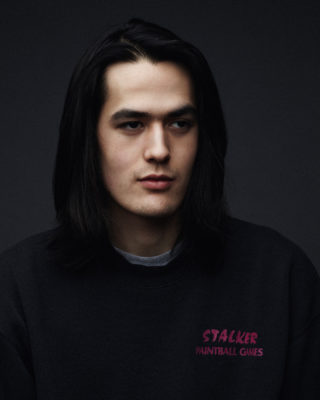
“We always wanted to make this second record sound as produced as we could,” says Cameron. “I never understood why bands would go into a studio to record a lo-fi sounding record. You do it out of necessity. A good way to gage a lo-fi record is if you were to take away all the noise and were left with the songs, would they be good enough to stand on their own?”
In terms of production value, ‘Dye It Blonde’ is a giant leap forward for Smith Westerns, not unlike the progression from Wavves’ reverb-dependent, tedious debut to last year’s hi-fi sounding ‘King of The Beach’. It’s made everyone think differently about the band and has vanquished not just the term ‘lo-fi’, but also ‘garage band’. Where ‘Smith Westerns’ channelled the sassy ghost of Marc Bolan, ‘Dye It Blonde’ largely reaches early ’70s-era John Lennon. Cullen’s besotted vocals – no longer rasping with fuzz – certainly play their part, as do the recurring, solid piano chords, and a track called ‘Imagine Pt. 3’, but it’s Max’s bending guitar strings that makes a song like ‘Still New’ sound so much like Lennon’s ‘#9 Dream’ or ‘Mind Games’. They swoon similarly on ‘All Die Young’ – the kind of slow motion ballad solos that can only be played with closed eyes.
Cullen says that they knew their new, polished sound would probably alienate their existing fans (“They were going to hate it anyway,” he says, “so we chose to not care.”), but there’s still plenty of T Rex to go round, namely in a number of kazoo-like, glam rock guitar licks. Mott The Hoople get a look-in too (‘Imagine Pt. 3’ being more than a little ‘All The Young Dudes’), and Queen, thanks to ‘All Die Young’ – rather aptly – beginning like ‘Who Wants To Live Forever?’, and ‘Smile’ featuring a decidedly May-esque solo, which is only fully realised when I see the band perform live some hours after we meet.
In short, ‘Dye It Blonde’ proudly features the kind of anthemic rock tunes that punk gleefully stamped on and made shameful for bands as young as Smith Westerns. For all bands.
“Music now, if it doesn’t speak to you in a catchy form within twenty seconds, people turn it off,” says Cullen, “so we run the risk because a lot of the best songs on the album take a long time for people to get. You need to listen to them two or three times and have it unfold upon you, and if you’re not paying attention you’ll miss the transition from one thing to the next. Plus, also, we were really tired of seeing one-minute-long songs banged out on a lo-fi guitar and everyone’s shitting their pants about it, so we wanted to use a little more finesse. Since the early 2000s everyone’s been trying to be minimalist like Jack White, so we were like, ‘let’s just overload everything, but in the most tasteful way.’”

Quietly sipping on Bloody Mary’s in a north London pub, it’s when I ask the band what they don’t like that they’re most animated. The subject is ‘Undesirable terms used to describe Smith Westerns’. Cameron starts with ‘garage’. Max quickly adds ‘ramshackled’, and then ‘jangly’.
“Youngsters,” continues Cameron.
“Brats or bratty youngsters,” say Cullen. “Upstarts.”
“Snot-nosed,” says Cameron. “All of those things just suggest that we stumbled upon what we’ve made, like we just fell on our instruments and made this music by accident.”
At nineteen, twenty and twenty-one years old, such hyperbolise are difficult to avoid when discussing this band though (kinda like talking about The Rolling Stones without saying “dinosaurs” or “old-timers”), and while they’re not fans of such buzzwords, they’re rarely used to derogatory effect.
Sat in a line, the band shake their heads. “We’ve not had any bad reviews of the album,” says Cullen. “Our only bad reviews, really, are live reviews, and then it’s because we don’t look like Slash and David Lee Roth, because of the guitar shredding thing. It’s weird when you’re singing about love but it’s still a punk show,” he ponders. “People get pissed off when you tell someone in the audience to fuck off.” (Later that night I see Cullen do, more or less, just that when he introduces ‘All Die Young’ by saying, “This next one is depressing – it’s a real wrist cutter, so you people at the front who look really fucking miserable, you can cut your wrists to this one.”)
Unless you’re Radiohead or Natalie Portman, the world won’t stay smitten forever though. Right now, on April 7, 2011, Smith Westerns are a band that can do little wrong, but back home in Chicago there are some who’ve started turn on them.
“That’s the only place where we’ve experienced a backlash,” says Max.
“And I don’t know why that is,” says Cameron. “They’ll be like, ‘those guys don’t represent the Chicago music scene, there’s so many better bands,’ and I’m like, ‘okay, I like music, show me these bands and I’ll go and see them.’ It’s a weird thing in Chicago, because the press there can sometimes really be on one local bands’ side, and they come after us the more poppy we get, which is kind of ridiculous. So that was weird – going from barely any Chicago exposure to getting exposure within the music scene to having the papers ragging on us.”
This isolated experience of “ragging” perhaps explains why the band are so coy when we first meet, as well as the fact that they’re on a promotion merry-go-round that they’ve ridden before, and that yesterday was ‘fucked up Wednesday’. We’ve completely fallen for ‘Dye It Blonde’ over the last month or so – its intrepid approach to stadium rock indulgence; its brazenly teenage themes that make songs called ‘Falling In Love’ feel so rightly placed; its unapologetic ambition – but they don’t know that. I could be just as flippant as the guys back home.

Cullen seems especially concerned about a Cold Cave album review that appeared in last month’s issue. “Oh wow, Cold Cave got slammed,” he says as we sit down to begin the interview. In his louche Midwestern speak, it’s difficult to tell if he agrees with the 4/10 mark or not. And later, when he reads the review mid-interview, nudges Max and signals the brilliantly schoolboy wanker gesture, it’s not much clearer either.
Perhaps a few green-eyed naysayers in their hometown has made Smith Westerns weary of the written word, but Chicago is almost certain to be a blip, and one that could well be amended when the band tour with Wilco. “Jeff Tweedy is the like the king of Chicago where music is concerned,” says Max, “so a pat on the back from him means that people will be like, ‘Oh, if Jeff Tweedy likes them they can’t be that bad.’”
“It’s like being knighted,” says Cullen.
Where Smith Westerns have really succeeded – beyond any doubt, and even personal taste – is in their ability to follow their scrappy debut album with the record they promised to make. The lo-fi excuse has always been, “If only someone would give us a chance to record our songs properly,” but it’s often an empty threat – heaven forbid if someone slapped most DIY bands in a proper studio to make an album as lush sounding as ‘Dye It Blonde’ turned out to be. It’s a record of anthems that it’s ok to like, and when did you last hear of an album like that?




